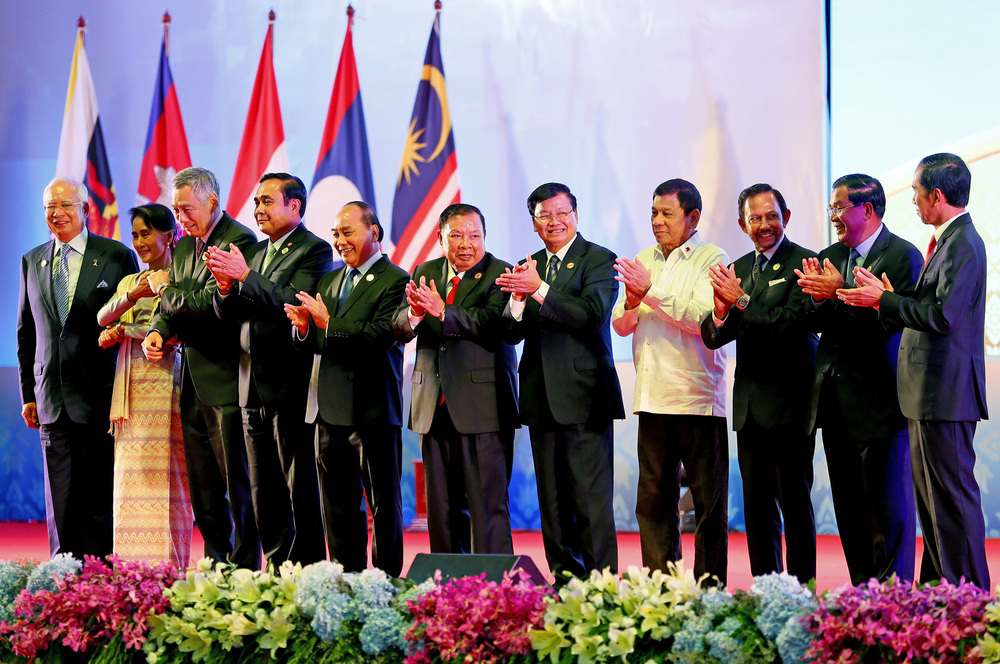Commentary: Becoming an ASEAN citizen a challenge

Leaders of the Association of Southeast Asian Nations pose for a group photo following 28th ASEAN summit plenary meeting at National Convention Center in Vientiane, Laos, Tuesday, Sept. 6, 2016. AP/Gemunu Amarasinghe, File photo
In our discussions of Southeast Asia and ASEAN, we often fail to give importance to the concepts of a shared identity and the socio-cultural community that serves as a pillar of the ASEAN process. More than simple geographic realities, this sense of community will be a driving force to sustain our trajectory of cooperation.
Where are we today? An Asia Barometer survey in eight Southeast Asian countries found that media rarely covered ASEAN topics, leading to under-developed public awareness. Other surveys, discussed below, find that the depth of awareness is uneven both within and between ASEAN countries.
In line with the objective of understanding ASEAN better, on August 3 to 4, the Stratbase ADR Institute, in partnership with the Carlos P. Romulo Foundation and the ASEAN Institutes of Strategic and International Studies network, are hosting a conference entitled “ASEAN at Fifty: The Way Forward.”
The conference will gather insights from luminaries from across Southeast Asia. The forum will tackle themes including the international strategic landscape, the economic environment, challenges to peace, security, and stability, resilience to the threats of climate change and an agenda for the digital economy and ASEAN’s sense of community.
Identity
In 2012, a study produced by the ASEAN secretariat found that while 81 percent were familiar with the ASEAN name, surpassing even the secretariat’s expectations, 76 percent of the general public in ASEAN’s capital cities have a limited understanding on ASEAN. Unfortunately, the same study found that there were some negative perceptions of ASEAN economic integration among the business community and the general public. These concerns included fears that labor migration might cause local employees to lose their jobs, or that local producers would not be able to cope with competition from other ASEAN companies.
The study may be five years old, but its findings continue to resonate with global politics today. The rise of anti-globalization sentiment in the West may yet find its way into our own societies if not carefully handled. However, the notion of “us-versus-them” can be mitigated with a greater push for a sense of cross-border kinship and understanding.
A 2017 Philippine Institute for Development Studies study examines the Filipino people’s attitudes towards ASEAN, and their aspirations and hopes for the regional bloc. The survey showed that around 32 percent of Filipinos are very familiar with ASEAN and 50 percent are moderately familiar, with familiarity increasing with age. Unsurprisingly, awareness of and affinity to the ASEAN were stronger among respondents from the academe and government.
Despite ASEAN’s recent economic focus, Filipino perceptions on ASEAN were more tempered among members of the business community. For this group, while membership in the ASEAN was viewed favorably, the response from the benefits of this membership was only lukewarm.
Nevertheless, respondents were generally optimistic about the future of ASEAN. By 2025, respondents expected a greater connectivity within ASEAN, where goods, labor and capital can move more freely across its borders. The respondents also anticipate greater awareness of ASEAN and its programs, as well as a more engaging ASEAN community. Most impressively, 43.6 percent of Filipinos said that they “very much” feel that they are ASEAN citizens and 33.9 percent said they “moderately” feel they are ASEAN citizens.
Apart from being a citizen or not, other surveys show that the public feels little connection to ASEAN. More educated Southeast Asians and those living in urban areas, are more likely to have higher affinity for the regional bloc. These results are reinforced in a March 2017 Pulse Asia Survey, where awareness of ASEAN among Filipinos was at an overwhelming 97 percent. Familiarity with the regional bloc was also lowest among the Class E respondents. Trust in the ASEAN was also high, with 22 percent saying they had “a great deal of trust” in the ASEAN and 59 percent saying that they had a “fair amount of trust” in the regional organization.
These surveys highlight that while awareness of ASEAN is quite high, the generally muted response with regards to affinity to the regional group could be attributed to limited public information about ASEAN, its activities, and accomplishments. Increasing familiarity and awareness with the ASEAN could also improve people’s connection to it.
Relevance
Throughout the years, ASEAN has shown that it is capable of unifying member states around cooperation. While effecting reforms might have come at a sluggish pace, the “ASEAN way,” grounded on values such as non-interference, consensus-building and nonconfrontational negotiations, has still resulted in landmark achievements for the bloc.
However, the demands of our time require a different approach. ASEAN’s challenge is to ensure its continued relevance given the shifting geopolitical tides. As Richard Heydarian writes in a recent occasional paper for our institute, China’s increasing assertiveness is not only disturbing the region’s security architecture, but is also “undermining ASEAN’s internal cohesion and quest for centrality in East Asian affairs.” With China’s growing clout in the region, ASEAN member states must take on a region-centered approach in their diplomacy. However, doing so would require a stronger sense of community among Southeast Asians.
How do we get there? Fostering a community is a tricky thing and not easily promoted from the top-down. Our businesses, academic institutions and civil society organizations will not only need to work together with ASEAN counterparts, but promote their partnerships in our respective societies.
Dindo Manhit is the president of think tank Stratbase Albert del Rosario Institute, a partner of Philstar.com.
- Latest




























